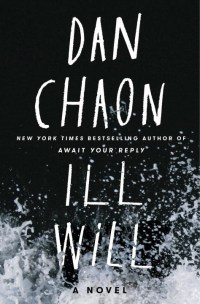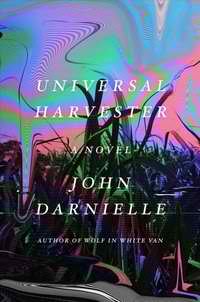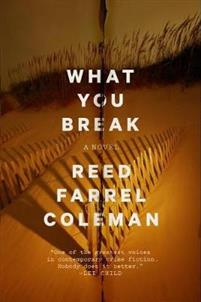Ill Will by Dan Chaon
 Monday, March 20, 2017 at 9:30AM
Monday, March 20, 2017 at 9:30AM 
Published by Ballantine Books on March 7, 2017
Two brothers are married to two sisters, which is weird for their children (the biological and an adopted son of one couple, twin daughters of the other), who are cousins and nieces/nephews at the same time. When the youngest child, Dustin Tillman, is still fairly young, both sets of parents are murdered. Dustin’s adopted brother Rusty is convicted of the murders and sent to prison.
The murders occur in the 1980s, when juries eagerly believed in nonsense about “Satanic ritual abuse” that (like many of the sensationalistic phenomena reported by Geraldo Rivera) turned out to be nonexistent. One of the key witnesses regarding Rusty’s satanic tendencies was Dustin. How that came to happen is revealed slowly as the story unfolds.
Now middle-aged, Dustin is a psychologist. Like many psychologists, he’s a mess. He once worked as a forensic expert, specializing in Satanic ritual abuse and recovered memories, two fields that were widely discredited in the years that followed. He reinvented himself as a conventional psychologist who hypnotizes patients to help them stop smoking and deal with chronic pain.
As the story begins, Rusty has been released from prison, having finally established his innocence. Some of Ill Will recaps Dustin’s childhood and his relationship with Rusty and his twin cousins, Kate and Waverly. Some of the novel follows Rusty’s telephonic relationship with Dustin’s son Aaron, a young junkie who can’t find any motivation to make a life for himself. It is a challenge to decide whether Dustin or Aaron is more damaged. A small part of the story focuses on Aaron’s brother, who sensibly wants nothing to do with his family.
And some of the story centers upon Dustin’s relationship with a patient, Aqil Ozorowski, a police officer on medical leave, who is preoccupied with the deaths by drowning of several intoxicated students in Ohio. Ozorowski believes they are part of a pattern. An urban legend has grown around that theory, giving birth to a hypothesized killer known as Jack Daniels. If Jack Daniels exists, is he responsible for the death of Aaron’s friend Rabbit?
The key theme of Ill Will is that events have the meaning we choose to give them. Truth is ambiguous. Truth is whatever we believe truth to be. If we choose to see a pattern, one exists. If we choose to give the relationship between events no meaning, the events are unrelated. Seeing patterns where none exist explains why conspiracy theorists are so troubled about unrelated facts, but not seeing patterns between connected events (perhaps for fear of being labeled a conspiracy theorist) can lead to false conclusions. Untrue things (like the spread of Satanic cults) become true when enough people believe them to be true — at least until most people finally realize that they never were true.
Other themes include the power of suggestion, the malleability of memory, the ease with which children can be manipulated (and their unreliability as witnesses for that reason), how abuse is like a virus that turns the abused into abusers, how “accidental and random” life can be, and how bullying can have unexpected consequences.
Dan Chaon’s prose style is often unconventional. Some sentences trail off or have extra spaces between words, reflecting the way people pause or stop talking when they don’t know what to say. Some of the story appears in text balloons. One section is written in three adjacent columns representing three different points of view. None of that put me off and some of it is clever, although the columns are hard to read in digital format. This is yet another reason to believe that print editions of a book make for better reading, even if they are less convenient.
The first half of Ill Will builds characters and background, while the second half builds tension. The plot is based on a series of misunderstandings and mistaken conclusions that prompt characters to take unsound actions ... or malicious actions that are true to their nature.
I didn’t care much for Ill Will’s unlikable characters and strange plot until it began to grow on me. By the time the story reached its conclusion, after I realized what Chaon intended and how effectively he accomplished that intent, I became a believer.
RECOMMENDED
 TChris |
TChris |  Post a Comment |
Post a Comment |  Dan Chaon in
Dan Chaon in  General Fiction,
General Fiction,  Thriller
Thriller 


